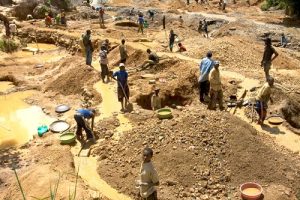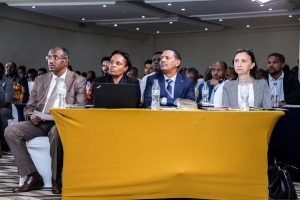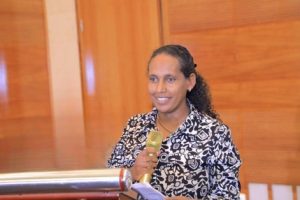African Ministerial Conference on the Environment (AMCEN) serves as a catalyst for action, policy development, and regional cooperation in the field of energy and the environment in Africa. By fostering dialogue, to exchange knowledge, share best practices, collaboration, and develop common strategies to address pressing environmental issues affecting the continent. Additionally, to promote the transition to renewable energy sources and energy efficiency across the continent, it is also addressing broader environmental challenges in Africa. It focuses on key issues such as biodiversity conservation, sustainable land management, climate resilience and the protection of Africa’s diverse ecosystems.
The 19th African Ministerial Conference on the Environment (AMCEN) was held last week here in Addis Ababa. In his opening remarks at the conference, Demeke Mekonnen, the Deputy Prime Minister and Foreign Minister of Ethiopia, said as the challenges related to climate change and environmental degradation are compromising our objectives to meet the UN Sustainable Development Goals and Agenda 2063 of the African Union, Africa needs to work with international partners to create a safer and more sustainable future. These manifold challenges threaten the resource base of agriculture in Africa, he added.
Demeke also underscored the fact that standing together in matters of climate change and sustainable development is a global responsibility and commended the African Group of Negotiators for their coordination of African common positions in climate and environmental negotiations.
The Green Legacy Initiative and a long-term climate resilient economic strategy are important tools for fighting the negative consequences of climate change and achieving the goals of the SGDs and Agenda 2063 in the nation, as the DPM and FM, Demeke, highlighted during their discussion of national imperatives in this respect.
Demeke stated Ethiopia’s commitment to assisting projects that attempt to address environmental problems. He further made it clear that humankind can only successfully find a lasting solution through strengthened international cooperation.
In addition, United Arab Emirates (UAE) Industry and Advanced Technology and COP 28 President-Designate, Sultan bin Ahmed Al Jaber said that Ethiopia is just one country that is leading the way with its Green Legacy Initiative. Since 2019, the GLI has planted over 25 billion seedlings, enhanced sustainable agriculture, strengthened food security, exported healthy food to foreign markets and created almost one million new green jobs along the way.
Tabi Jodha, ambassador for the Great Green Wall, told The Ethiopian Herald that African countries need to adapt new actions around greening and reducing the effects of desertification, drought, and land degradation, which transmit vulnerabilities to climate risk and disasters. And also, the green legacy is a commendable initiative, the whole idea of surmounting courage to engage stakeholders, communities, women, youth and the entire country in understanding and coming together to do something that is viable, naturally sensitive and smart. And he also stated that this program is restoring Africa’s degraded lands across the continent as well as reducing carbon emission globally.
Research shows that in the Horn of Africa, rains have not fallen for over four seasons, with 23 million people now facing severe hunger across Ethiopia, Kenya and Somalia. Lake Chad, once the lifeblood for millions of people in Nigeria, Niger, Chad, and Cameroon, has shrunk to one tenth of its size. And continuous flooding has ruined crops and spread vector borne diseases across Malawi, Mozambique, Madagascar, Zambia, and Rwanda.
Al Jeber emphasised that the urgent need to increase climate finance for African countries to allow them to seize the opportunity of a zero-carbon, climate resilient future.
Elisabeth Mrema, UN Under-Secretary General and UNEP Deputy Executive Director, said that by 2030, Africa will need nearly $3 trillion in climate financing. To match that kind of capital, countries must unlock more domestic private sector financing for resilience and related projects. The global community has a duty to lighten Africa’s deadlock, which is vital if a developed continent is to finance the transition to a climate-resilient future. So, as Africa contends with climate change, we cannot forget the need to protect biodiversity.
Africa currently receives only about 10% of all global climate finance. In order to fulfill Africa’s Nationally Determined Contribution (NDC) pledges until 2030, the African Development Bank estimates that over 250 billion dollars per year will be required, Al Jaber elaborated.
Al Jaber noted that this 54-country continent receives less than $30 billion USD annually despite producing less than five percent of the world’s emissions. And compared to the rest of the globe, private financial flows to Africa are very small. The facts are as follows. They must be fixed. And they require immediate replacement.
On the other hand, a mounting problem is plastic pollution, according to research, humanity produces more than 430 million tons of plastic annually, two-thirds of which is contained in short-lived products that soon become waste. The reality is that Africa must find a way to start weaning itself off plastic. It’s clogging the continent’s rivers; it’s polluting its air and making its way into the human food chain.
In terms of energy, Africa’s natural resources, huge mineral opportunities to create clean, good and sustainable energy for homes and for running small enterprises, which is very key for the continent’s development so that the green transition can be a holistic, inclusive and sustainable one that brings hope for the continent.
The African countries must work to restore damaged landscapes, especially those that have fallen victim to desegregation. Africa’ economy is based on its natural resources, in particular agriculture, livestock, and minerals. In other words, Africa’s economy, prosperity depends on land, water, and healthy ecosystems. And during the last 70 years, Africa has lost two-thirds of its productive land, while its population has increased six fold. Drought and land degradation are already turning the lights on, devastating economies and destabilising the peace and security of the country.
She underlined that restoration helps to protect biodiversity, conserve water, combat poverty and slow climate change. As we are restoring land, we must also work to limit the damage done by the extraction of minerals critical to the transition to clean energy, harvesting these minerals, which include lithium, nickel and cobalt, means uprooting forests and ravaging sensitive landscapes. These actions are ultimately self-defeating.
She also said that to tackle these crises, we need to have a common voice to support growth while protecting biodiversity, limiting greenhouse gas emissions, reducing and recycling waste, and also helping the people of Africa to adapt to climate change.
Al Jaber noted that there are many issues that should be addressed and Africa has a powerful voice on a global stage. However, the chronic lack of available, accessible, and affordable climate finance is a major obstacle standing in the way of further progress on climate action.
Demeke underlined that the African Ministerial Conference on the Environment (AMCEN) is a platform for collective endeavors and action. The conference plays a key role in shaping Africa’s response to pressing challenges relating to climate change, sustainable development, and the environment.
Besides, a diversified strategy is needed to address Africa’s energy and environmental issues. It requires boosting energy efficiency, speeding the implementation of renewable energy technology, and expanding access to clean and affordable energy services. Africa’s ecosystems and biodiversity must be protected through sustainable land use practises, conservation initiatives, and wildlife protection. A sustainable future for the continent also depends on enhancing climate resilience and implementing climate change mitigation measures into growth strategy.
For Africa to recognize its full energy and environmental potential, regional collaboration, the exchange, of knowledge, and financial support are crucial. Africa can go to a cleaner and more sustainable energy future while maintaining its natural legacy for future generations by sensibly exploiting its renewable resources. Moreover, addressing the continent’s energy and environmental challenges can contribute to global efforts in combat climate change and achieve the Sustainable Development Goals.
BY FIKADU BELAY
THE ETHIOPIAN HERALD SUNDAY EDITION 20 AUGUST 2023





